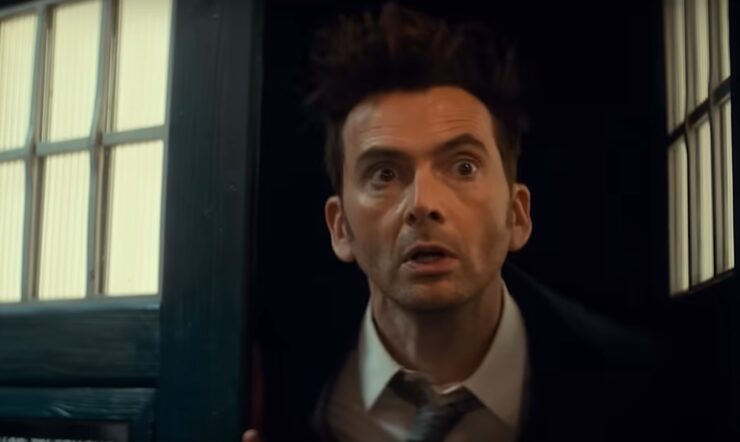It’s basically 2008 all over again! I don’t know that I’m emotionally capable of handling that transition, but seeing that transition is pretty much what Doctor Who is all about (as this episode proves from multiple angles)… let’s get to it.
Recap
In case you didn’t catch it, I’ll start with a brief recap of the Children in Need Special, “Destination: Skaro”: Davros (Julian Bleach) meets with an assistant named Mr. Castavillian (Mawaan Rizwan) to discuss his latest weapon to aid the Kaleds in their war against the Thals—an armored machine in which he plans to put their people once they’ve been genetically modified to that end. After being unimpressed with all of Castavillian’s possible names and ideas, Davros leaves the room for a moment. The TARDIS promptly crashes there—taking the weapon’s claw arm with it—and the Fourteenth Doctor (David Tennant) emerges. He immediately recognizes and names the Dalek, as well as its catch phrase, giving Castavillian plenty of good ideas. Realizing that he’s emerged at the Dalek inception point, he insists he was never there, but does replace the claw arm with the first thing he can find on the TARDIS: a plunger. Davros reenters after the Doctor is gone, sees the plunger, and decides that he loves it.
Onto the episode: After a brief reminder of New Who’s season four finale, the Doctor lands in London during the holiday season and immediately runs into Donna Noble (Catherine Tate) and her daughter Rose (Yasmin Finney). Trying his best to avoid contact, the Doctor ducks away as a spaceship appears to crash-land nearby. He runs into Donna’s husband Shaun Temple (Karl Collins), and pretends to be a friend of Nerys to explain all the weird personal questions he’s asking, the main one being why Shaun is driving a cab given that winning lottery ticket he secretly slipped them after their wedding. It turns out that Donna gave away most of the money, except what they needed to buy a house.
The Doctor heads to the crash site and meets Shirley Anne Bingham (Ruth Madeley), a scientist for U.N.I.T. who is excited to have her first encounter with the Doctor. He tells her that it feels as though fate is drawing him back to Donna Noble and explains that this is the first time that he’s regenerated back into someone he used to be—he worries that he doesn’t know himself anymore. Meanwhile, Rose bemoans her mother always missing all the alien stuff while Donna’s mother Sylvia (Jacqueline King) pretends not to notice it either. One of Rose’s friends brings her over to an additional crash site where an escape pod seems to have landed. Back behind the bins at home, Rose discovers a cute furry alien who calls itself the Meep (Miriam Margoyles), and warns her that it’s being hunted. She agrees to hide the Meep in her shed out back where she makes plush toys to sell abroad.
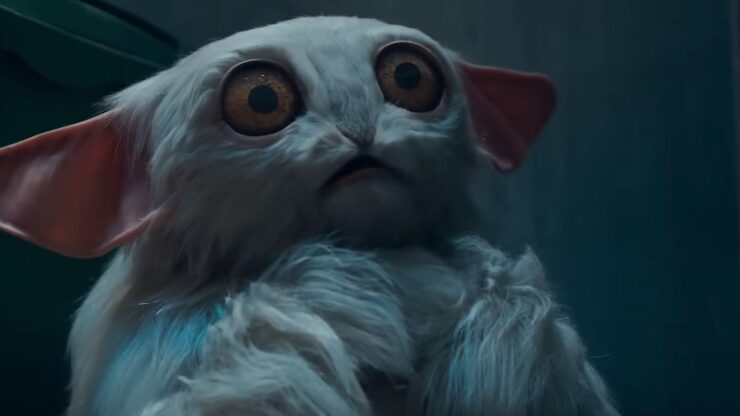
A team of U.N.I.T. soldiers try to break into the ship—which Shirley Anne believes parked in the steel factory rather than crashing into it—and are promptly brainwashed and go searching for the Meep. A group of aliens who look like bipedal moths called the Wrarth are also on the hunt. Donna goes to fetch Rose from the shed and finds the Meep, leading her to pull her daughter and the alien inside and ask why this is going on while Sylvia keeps trying to stop Donna from looking at the thing. The Doctor shows up on their doorstep and Sylvia tries to keep him out, but he figures Donna will be okay so long as she doesn’t remember him, and enters to try and figure out what is happening. The family is promptly attacked on both sides by the Wrarth and possessed U.N.I.T. soldiers, so the Doctor helps everyone upstairs and decides to escape through the attics of adjacent homes.
As the family flees in Shaun’s cab, the Wrarth fire on them, but nothing really happens to the cab. The Doctor parks in a lot and waits for the aliens to catch up, invoking the Shadow Proclamation and naming himself an arbiter in the proceedings. He points out that the Wrarth are using stun weapons and not trying to hurt anyone, and that the U.N.I.T. soldiers don’t seem to be working for them at all. He’s told that the Meep were a conquering species that almost succeeded in their horrible aims, and that this particular Meep was their ruler and the worst of them all. The Wrarth are trying to capture the Meep before it can do anymore damage. The Meep finally admits to all this and is planning to fire up their ship and escape using a “dagger drive”—which will destroy all of London if it goes off. The Meep is then retrieved by the brainwashed U.N.I.T. soldiers to be brought back to the ship. The Doctor and Donna’s family are taken hostage, they escape captivity thanks to Shirley Anne Bingham (and her packing wheelchair), and Donna insists that Shaun and her mother take Rose at least ten miles away to be safe… but she plans to stay with the Doctor.
Buy the Book


Exordia
The Doctor is trying to shut off the drive, but he can’t work fast enough. He explains to Donna that she could help him fix it, but it would lead to her death. Donna doesn’t care because there are nine million lives at stake, including her daughter’s, so the Doctor says the necessary string of words to break the wall in Donna’s mind and bring back the metacrisis knowledge she possesses. Donna berates the Doctor for what he did (mostly because the bit of him that still resides in her is the reason she gave up the lottery money) while the two of them work to stop the drive as it’s firing. Donna dies in the Doctor’s arms and he’s about to be executed by the Meep’s soldiers—when Rose suddenly steps in to help and Donna wakes. The Doctor sees that the metacrisis became a legacy that Donna passed down to her daughter. Donna realizes that the knowledge of these events have been bleeding through in choices Rose has made—the shed that looks like the TARDIS, her chosen name, and her toys that look like aliens that the Doctor and Donna encountered together. Donna sees that they are binary but her daughter is not (and that the Doctor can be any of those things or none), and this has helped to balance the scales. Rose stops the Meep by ejecting it from the ship and London is saved.
The Meep is sentenced to prison for 10,000 years and threatens the Doctor: it plans to tell someone called “the boss” about his dual hearts. The Doctor tells Donna and Rose that they will still not survive the metacrisis energy levels, but they’re not worried—they understand the problem far better than a man ever could and simply release it. Rose feels like she’s finally fully herself. Later on, the Doctor and Donna ask if they can go visit Wilf together in the TARDIS (he’s in a community for the elderly now that he can no longer manage stairs), and Sylvia begrudgingly agrees. They both get aboard the redesigned TARDIS, which the Doctor tears around in a flurry of excitement. The console has a coffee-maker, so the Doctor gets Donna coffee and she suggests that he could stop by sometimes even if they’re not traveling together. Then she spills her coffee on the console, breaking everything and sending them… potentially anywhere in time and space.
Commentary
Look, there’s plenty to talk about, but I can’t start without saying… I missed them so damn much.
I also have to start by pointing out that reinstated showrunner Russell T. Davies was always taken to task by a certain contingent of Whovians (and the internet at large) for having an “agenda,” in a political sense, particularly when it came to queerness. And this episode seems very specifically designed to say oh, I’ll show you an agenda in sky writing, with letters at tall as skyscrapers.
So yeah, I also missed Davies a bunch.
This has all the hallmarks of a Davies episode, for good and ill: It’s high camp; it’s high emotion; it’s queer af; it’s got deus ex machinas up the wazoo; the villain is just as comical as they are scary (“Midnight” was pretty much the only exception to this); and London is in such imminent peril that it’s literally impossible for it to survive the attack that just occurred, but it’s completely fine.
Seriously, the dagger drive creates fractures and fault lines throughout the entire city, and in my head I thought these are going to close right up like they never existed as soon as they deactivate that drive, and that’s exactly what happened. Davies, my man. It makes no sense, but I have never minded when it’s you writing it.
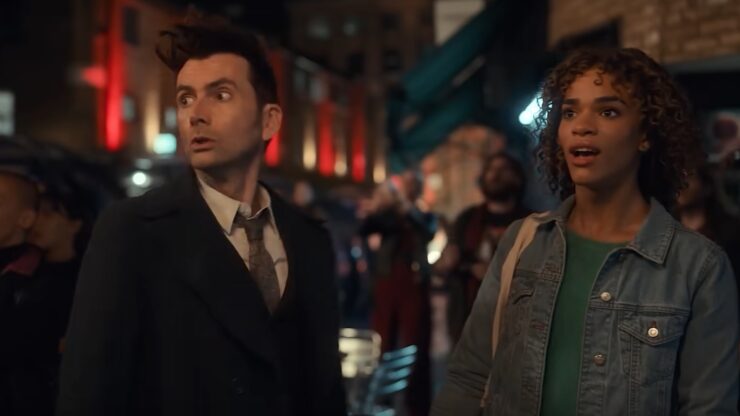
I do need to give him a bit of a hard time for the way gender identity plays into the solution of the episode, however. The accidental gift that Davies gave himself in having “binary” being the word Donna got stuck on during the metacrisis meltdown in season four was a great gateway into the discussion, and I do love the interplay of the DoctorDonna being a binary while Rose Noble isn’t—mostly because it speaks to a better understanding of trans identity than most shows have. The thing is… I’m not sure if that’s by accident or design. Trans people are not all nonbinary due to being trans. Rose is a trans girl from the language used—Donna calls Rose her daughter, Rose uses she/her pronouns, no mention of genderfluidity is made—but it’s important to remember that plenty of trans people consider themselves nonbinary within their gender. There are nonbinary women and nonbinary men under the trans umbrella. It would have behooved them to be a little clearer in how they were using these words because most people still don’t have working definitions.
Having said that, I did appreciate the conversation between Donna and Sylvia about Rose because it was both incredibly well-written on its own and an excellent guideline for families with trans kids. Sylvia and Donna both express that they’re a little confused by all the changes, but they pointedly do so when Rose isn’t in the room; when she is in the room, there are only expressions of love and support. Moreover, Donna talks of the changes ultimately being positive, of how incredible it is to suddenly have this wonderful daughter seemingly out of nowhere… and then uses that example to try and get Sylvia to say something nice about her. It’s a great scene that doesn’t forget the family dynamics we’re already familiar with: that Sylvia was incredibly harsh toward her daughter for ages, and that Donna still has to prod her mother into complimenting her.
I also appreciate the continuing characteristic of the Doctor being entirely unfrazzled if corrected on how he speaks about sentient beings. When Rose points out that the Doctor is assuming the Meep’s pronouns, the Doctor is never offended—he pauses, reconsiders, and corrects himself without annoyance. And that’s important because, again, it’s a guideline: Maybe this isn’t a part of your daily life, the show is saying, but when you do encounter it, this is how to react with grace.
But then again, there’s a weirdness right there at the end with how Rose and Donna avoid having their heads exploded by Time Lord energy; when pressed, they both insist that the Doctor can’t understand how to fix this anymore because he’s a man, but they can as women. And what they know is that they can simply release the energy instead of making everything all fraught. And it’s just… goofy. Again, there’s that insistence in some realms of pop culture and fiction that feminism is just acknowledging that women are somehow better than men, and that’s what this moment reads as, instead of trying to point out ways in which they might be different due to experience.
They missed a trick by not giving a more specific explanation as to why Donna and Rose can figure out how to fix the metacrisis problem. It could have been tied to their gender, but it needed to not be a lazy “because we’re girls and we get it.” Moreover, it should have been something that the Doctor could understand once it was explained to him; he was a woman less than a day ago, it hasn’t just left him in a rush.
And then there’s also the question of how the Doctor views his own gender identity. It seems that the Doctor basically assumes the gender of whatever their body would be “assigned” based on its shape (which is what other Time Lords are shown to do as well), and I don’t hate that as a choice—the Doctor is an alien and Gallifreyan views on gender and bodies are liable to be different from a human’s. But I do wish the Doctor would talk about it a little? Especially in light of the changes that have just occurred.
So those are my quibbles, and they’re significant in their own way, but I also cannot care because Ten is my Doctor, and now Fourteen is also my Doctor because it’s just Ten having the benefit of being far older, much wiser, and more caught up in his emotions. The face he makes when he talks of how much he loves Donna—the shock at being the same person he was four regenerations ago, but still different because he never used to say things like that—is so important to how these anniversary episodes will unfold. We don’t have the full picture on why the Doctor did this, and there’s likely to be a sneakier explanation at work, but there doesn’t need to be.
The Doctor missed his best friend. Missed having a best friend.
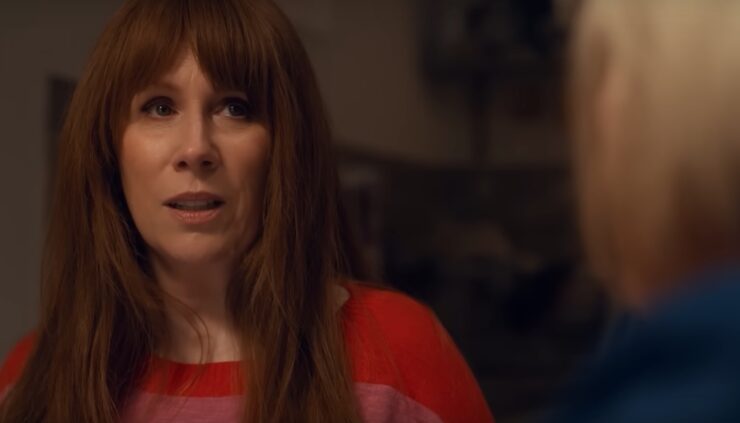
And now he’s a raw ball of feelings in a plaid suit, back to being this bouncy, hyper-dramatic, aggrandizing fellow, who needs that balance back. The way that Donna begins slotting herself into that place well before the walls come down, the part of her that knows she’s been there before… that’s how you do a reunion. That’s how you revive characters and a dynamic you’ve lost. The two of them egging each other on, the joy they find at being the DoctorDonna, the identical expressions they make when standing side by side like two kids begging to go outside and play in the mud—there are so many wonderful Doctor-companion dynamics, but this one is truly top tier. It shines this bright because Catherine Tate and David Tennant love working together, and that enjoyment permeates every scene where they’re in the same room.
Add Miriam Margoyles as that classic brand of Davies villain, two cups cute with a teaspoon of pure evil, add some silly moth aliens who really just want to help, add family nonsense and holiday cheer, and you’ve got all the ingredients for anniversary specials that are here to give a hug to a certain generation of Who fan while preparing us for something entirely new. I’m glad we’re getting this moment, and I can’t wait to see what comes next.
Bits and Bobs
- That Children in Need special was also perfect. Again, high camp and adorable.
- I do miss Segun Akinola’s scoring for the show, but if he’s ready to move on, bringing Murray Gold back was exactly the right move. Listen to that theme go.
- Dave Gibbons (probably best known for his collaborations with Alan Moore on Watchmen and Superman) and Paul Mills (who created 2000 AD and also had a heavy hand in the development of Judge Dredd) are given story credit here because Beep the Meep is their creation, written for a 1980 Doctor Who comic strip that bears the same title as this episode. Not sure why the comic’s other writer, John Wagner, didn’t receive credit.
- So the Doctor shows Shaun the psychic paper, insisting that he’s “Grandmaster of The Knowledge” (being London cab driver Knowledge, which is a real thing, by the by), but Shaun tells him that the paper says “Grandmistress” which prompts the Doctor to scold the paper to keep up. But we know this isn’t the issue because Thirteen had the exact same problem on her regeneration in the other direction, and moreover, the paper is called the psychic paper because it’s psychic. Ergo, the paper doesn’t need to keep up, it’s the Doctor who’s having a hard time remembering that he’s a man again. And I just think it’s neat.
- Shoutout to Nerys, who is apparently still in Donna’s orbit and causing issues everywhere she goes. Everyone’s got a Nerys in their life.
- The number of shoutouts to the season four premiere “Partners in Crime” are great, with the Doctor looking through the mail slot being one of my favorites. (Also that E.T. reference with the Meep hiding amidst the toys.)
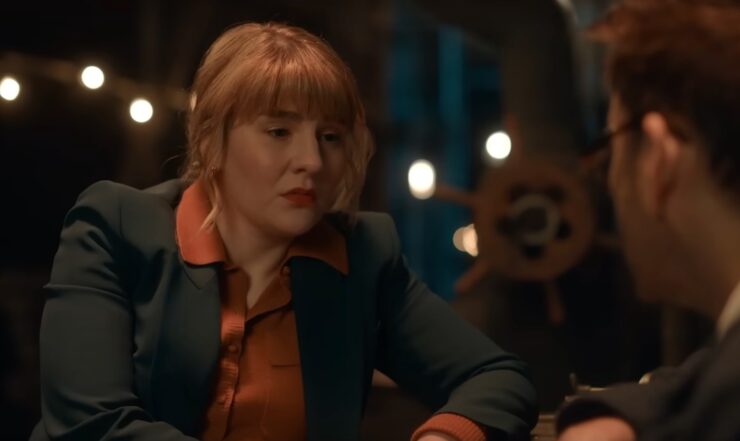
- Shirley Anne Bingham’s role in the episode is great, and while I’m always discomfited with U.N.I.T.’s militaristic leanings throughout the show’s history, I do appreciate their commitment to hiring misfit geniuses of varying neurodivergent and disabled stripes. And I also appreciate when it’s shown that you can work for an employer that values your expertise, and still fails to put ramps up to the spaceship you’re meant to study.
- The gorgeous shade of Donna pointing out that she’s going to hang out in a tiny box with another man, and Shaun Temple being like, my love, that man is not your type, I could just die.
- The new TARDIS interior is an interesting one—very old-school Who with the color and cleaner lines, but much, much larger in scope. Watching Fourteen run along the ramps was a shot of pure joy.
See you next week!










